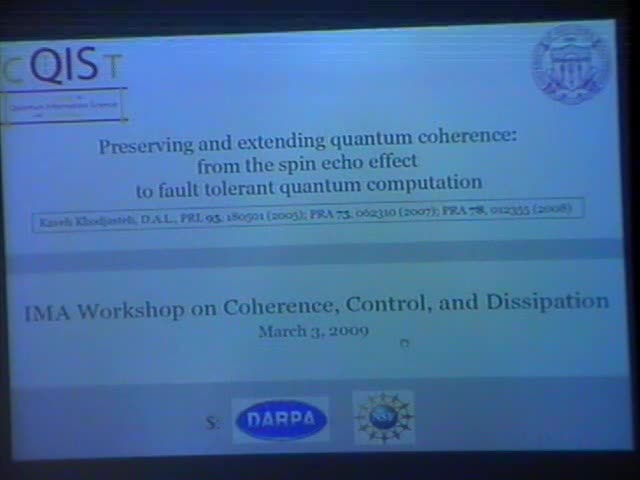Preserving and extending quantum coherence: from the spin echo effect to fault tolerant quantum computation
Presenter
March 3, 2009
Keywords:
- Quantum coherence
MSC:
- 81P40
Abstract
Dynamical decoupling pulse sequences have been used to extend
coherence times in quantum systems ever since the discovery of the
spin-echo effect. But while for good reasons the nuclear magnetic resonance (NMR) community has
typically been content with moderate line narrowing, in quantum
computing extremely high levels of coherence are required in order to
perform meaningful computational tasks. In this talk I will describe a method of
recursively concatenated dynamical decoupling pulses, designed to
overcome both decoherence and operational errors [1]. For
bounded-strength, non-Markovian environments, such as for the
spin-bath that arises in electron- and nuclear-spin based solid-state
quantum computer proposals, it is strictly advantageous to use
concatenated, as opposed to standard periodic dynamical decoupling
pulse sequences. Namely, the concatenated scheme is both
fault-tolerant and super-polynomially more efficient, at equal cost
[2,3]. Preliminary experimental results on NMR of 13C in adamantene
(due to Dieter Suter, Dortmund), and NMR of the 31P donor in Si (due
to Steve Lyon, Princeton), demonstrating the advantages of
concatenated decoupling, will also be presented. Time permitting, I
will describe our recent results on the construction of a universal
set of quantum logic gates whose fidelity can be kept arbitrarily high
for essentially arbitrarily long times in the presence of coupling to
a spin bath, by use of concatenated decoupling.
References:
[1] K. Khodjasteh and D.A. Lidar, "Fault-Tolerant Quantum Dynamical
Decoupling," Phys. Rev. Lett. 95, 180501 (2005).
[2] K. Khodjasteh and D.A. Lidar, "Performance of Deterministic
Dynamical Decoupling Schemes: Concatenated and Periodic Pulse
Sequences," Phys. Rev. A 75, 062310 (2007).
[3] K. Khodjasteh and D.A. Lidar, "Rigorous Bounds on the Performance
of a Hybrid Dynamical Decoupling-Quantum Computing Scheme,"
Phys. Rev. A 78, 012355 (2008).
